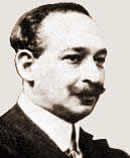José Ingenieros facts for kids
José Ingenieros was an important Argentine thinker, doctor, and writer. He was born as Giuseppe Ingegnieri on April 24, 1877, in Palermo, Italy. He later moved to Argentina and became a very influential person there. He passed away on October 31, 1925.
Contents
Early Life and Education
José Ingenieros studied at the University of Buenos Aires. He graduated from its School of Medicine in 1900. He became a doctor and also a pharmacist. During his studies, he was interested in the ideas of philosophers like Herbert Spencer and Auguste Comte. These thinkers believed in using science and reason to understand the world.
Important Ideas and Writings
José Ingenieros wrote many important books and essays. One of his most famous works is "El hombre mediocre," which means The Mediocre Man. He wrote this book in 1913. In it, he explored ideas about society and how people think and act. He encouraged people to be original and not just follow the crowd.
Contributions to Science
Ingenieros made big contributions to different fields of science.
- In 1907, he started the Buenos Aires Institute of Criminology. Criminology is the study of crime and criminals.
- In 1908, he founded the Argentine Psychological Society. Psychology is the study of the mind and behavior.
- In 1909, he was chosen to be the President of the Argentine Medical Association. This shows how respected he was in the medical community.
Later Life and Activism
In 1914, José Ingenieros married Eva Rutenberg in Lausanne. He was also involved in important changes at his university. In 1918, he played a key role in the University reform in Argentina. This reform aimed to make universities more open and fair.
In 1919, he left his university jobs to join a group called Claridad. This group had ideas about making society more equal. In 1922, he formed Unión Latinoamerica. This group worked against powerful countries trying to control weaker ones. It focused on anti-imperialism, which means opposing empires and their control over other nations. In 1925, he started a monthly magazine called Renovación. He died in Buenos Aires later that same year.
See also
 In Spanish: José Ingenieros para niños
In Spanish: José Ingenieros para niños


